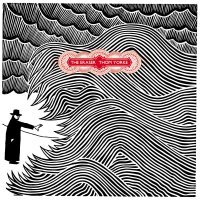
Thom Yorke
The Eraser

There are two types of Radiohead fans: those who like everything the band did up through OK Computer, and those who like everything they’ve done from OK Computer on. I count myself among the latter camp, viewing the abstract experimental/electronic left turn they took on albums like Kid A and Amnesiac as a big artistic step forward from the less distinctive, alternative guitar-rock approach of The Bends.
So why is it that I find The Eraser, the debut solo release from Radiohead lead singer Thom Yorke, to be so—well—unexciting? After all, it follows a very similar stylistic path to the band’s recent output, replete with glitchy samples, brooding electronics and, of course, Yorke’s fluid, stirring vocals, that even when subdued, always threaten to boil over into edge-ridden angst.
Quite simply, the fault lies in the two most basic building blocks of any recording: the songwriting and production. Let’s address the latter first: Yorke has recruited long-time Radiohead producer Nigel Godrich to man the boards, but unlike on the band’s last full-length, Hail to the Thief, there’s little sense of expansiveness or texture here. Somehow, even more organic sounds like a funk bass guitar or acoustic piano take on the dry and brittle profile of a MIDI file streaming off a laptop. Perhaps this was a conscious artistic decision, but even so, the net result is less wall-of-sound and more washroom.
However, the primary failing of The Eraser is that it simply doesn’t offer much in the way of musical development—it mostly follows the formula of establishing a static groove, then repeating it ad nauseum. In certain cases, this works effectively. Take “Black Swan,” for instance, a hypnotizing array of squelching bass, twangy guitar arpeggios and marvelously restrained vocal lines that manage to wring maximum emotion out of lyrics like “With your fingers, you can touch me.” Meanwhile, the title track, which opens the disc, makes its case with an off-kilter drum machine rhythm and scratchy sampled piano chords, buoyed by Yorke’s soaring, deeply felt vocal performance.
Otherwise, we mostly get distillations and fun-house reflections of Radiohead songs past, like the vaguely Middle Eastern “Analyse” (see “Backdrifts” off Hail to the Thief) and the nocturnal chill of “And It Rained All Night” (see the same album for “The Gloaming”).
Which is not to say The Eraser is a bad, or even mediocre, album. Despite its considerable flaws, it’s still quite an appealing listen. But clearly it suffers when placed alongside Radiohead’s output of the past decade. It may be unfair to have such high expectations of a premier solo outing, and, possibly for this very reason, Yorke’s album has been released with little in the way of advance hype. But how can you not miss the propulsive rhythms of Phil Selway beating on real, honest-to-god drums (even if buried under layers of effects processors)? Or Jonny Greenwood twiddling the knobs of vintage groove boxes in between washes of six-string distortion?
Overall, what The Eraser lacks is a feeling of dramatic movement, the sense that, at any time, all those bleeping keyboards, unapologetically synthetic drum machines and anesthetized vocal fragments could be leading us somewhere, breaking suddenly out of lock-step to coalesce into something passionately human. This is the dynamic that has made every Radiohead album starting with OK Computer so marvelously transcendent, and it’s sorely lacking here.
No comments:
Post a Comment